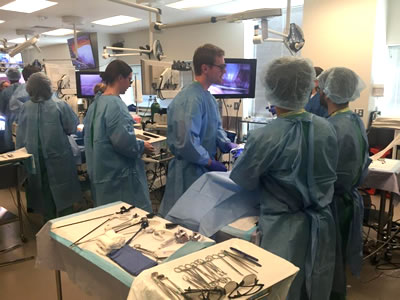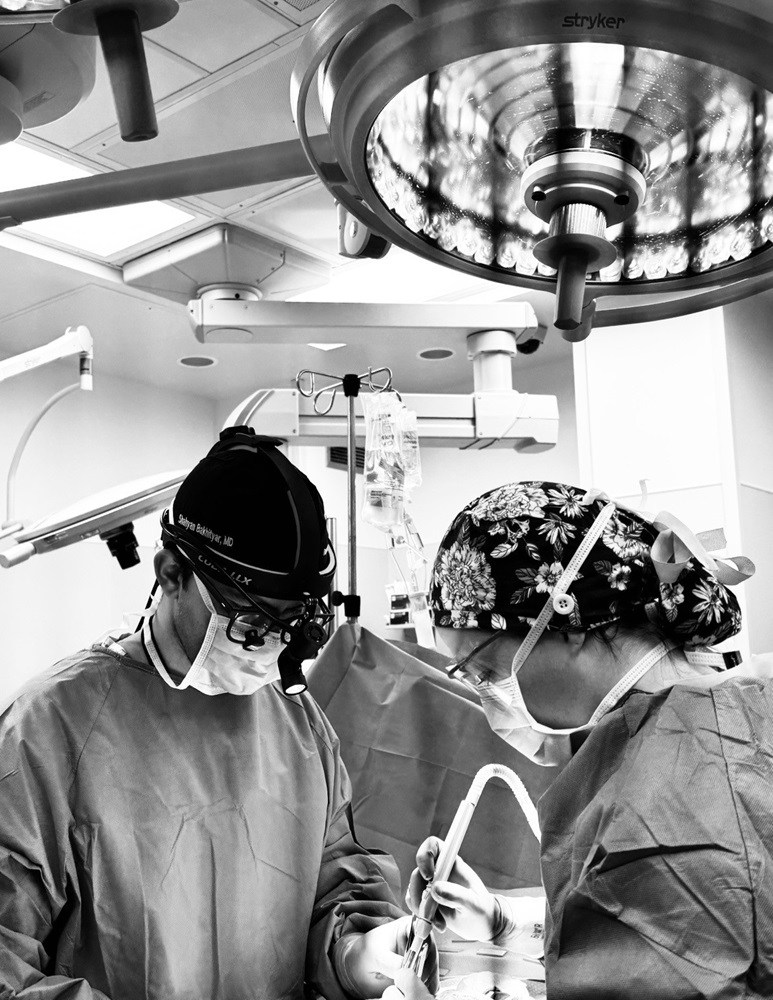Resident Rotation Overview
Clinical experiences at the University of Colorado Residency Program in General Surgery cover the full range of surgical services, provide exposure to a wide variety of surgical subspecialties, and allow for residents to participate in upper and lower endoscopy, critical care, Level I Trauma care, transplant and burn care. The sites within the residency program allow for exposure to diverse patient populations within the Level I academic health center, a Veteran’s Administration Medical Center, Denver Health, a busy Metro Denver Level I Medical Center, and Memorial Hospital in Colorado Springs, a busy Level I hospital with high case volume in general surgery, as well as a premiere Level I Children's Hospital.
Our surgical residents are challenged to be compassionate, technically competent surgeons and are given opportunities in the arenas of patient care, teaching, and research. Categorical residents will spend two years in the research laboratory or doing academic graduate work within this 7-year program. We also provide a clinical fourth-year elective, which many residents have chosen to spend overseas or regionally at a center of excellence in their chosen field.

Residents training at the Center for Surgical Innovation
Intern Year
The objectives of the surgical internship are to achieve a wide experience in the broad field of surgery, including preoperative evaluation and postoperative care of all classes of surgical patients and to begin the development of technical surgical skills. The essentials of preoperative and postoperative care include the recognition and treatment of surgical complications, fluid and electrolyte balance, wound care, and nutritional support. The categorical intern rotates through at least 1 block (1 block = 28 days) of pediatric surgery at CHCO; 1 block of vascular surgery; 1 block of general surgery at the VA; 1 block of cardiothoracic surgery; 1 block of oncologic surgery; 1 block of breast surgery; 1 block of night float at the University Hospital; 1 block of Plastic Surgery; 1 block of Emergent General Surgery or Trauma at Denver Health; 1 block of general surgery with robotic exposure; and minimally invasive surgery at Memorial Hospital. In addition, the intern does supervised surgical procedures, gains expertise in vascular access, and other invasive procedures (ex, tube thoracostomy, FAST examinations, etc.), admission work-ups, writes pre and postoperative orders, progress notes and hospital discharge summaries. The schedule for the interns and junior residents is templated to facilitate compliance with duty hour requirements and provide maximal educational exposure using several float services.

Second Year
During the second year of training the emphasis is primarily on perfecting motor skills and the management of more seriously ill patients. There are rotations on surgical intensive care, burn, trauma, general, oncology, vascular, endocrine, minimally invasive/foregut surgery, and surgical and cardiothoracic critical care, with exposure to a wide variety of seriously ill patients. The residents learn the ability to coordinate the daily work of busy services, evaluating surgical consultations, and assessing priorities in patient care. During intensive care rotations, the resident learns invasive monitoring, ventilator management and the critical care management of patients from all surgical disciplines as well as performing all invasive procedures such as central line placement, tube thoracostomy, bronchoscopy, percutaneous endoscopic gastrostomy, and tracheostomy. At the end of this year residents should be able to provide non-operative care to all classes of surgical patients regardless of the magnitude of illness or injury.
.jpg?sfvrsn=6a4123b4_2)
Third Year
In the third year, the resident is frequently the second most senior resident on service at the University of Colorado Hospital, Denver Health Medical Center, VA Hospital, Children's Hospital, and Memorial Hospital. At these institutions the residents are exposed to a wide variety of elective and emergent surgical cases in general surgery, pediatric surgery, transplant surgery, surgical oncology, thoracic surgery, trauma, colorectal, and endoscopy. Residents will also do a block rotation on breast as the primary resident. In addition, the resident is usually the consult person for these rotations. Gaining technical competence and breadth is a major objective of this year.

Fourth Year
The goals for the fourth year of surgical training are to refine the resident’s capabilities in independent surgical decision making, advanced surgical technique, and leadership. To accomplish this, residents rotate on services where they are usually the senior most resident on the service. The rotations include trauma and general surgery at Denver Health Medical Center, acute care surgery and colorectal surgery at the University of Colorado Hospital, and general surgery at Memorial Hospital in Colorado Springs. The Department of Surgery also sponsors a one-block elective during the PGY 4 clinical year, which the resident can take within an accredited surgical residency program in the US, or an international elective site approved for them individually by the Surgery RRC and the American Board of Surgery in accordance with their international rotation guidelines.

Chief Year
The goals for the chief year of training are for the residents to become competent in independent surgical decision-making and advanced surgical technique. To accomplish this, each resident is placed in a leadership position on general surgical services at the University of Colorado Hospital, Denver Health Medical Center, and the Veteran’s Administration Hospital. Chief residents are given leadership responsibility for a surgical service and coordinate and supervise all clinical and educational activities on the service. The rotations include trauma, surgical oncology, endocrine, hepatobiliary/bariatric, minimally invasive/foregut surgery, vascular, and general surgery as well as robotic procedures in general surgery. Since the University of Colorado only has a few fellows—this year is an opportunity to improve skills with primarily fellowship trained surgeons focusing on the above areas with the chief resident as the focus of each rotation. Total case experience and breakdown can be found in this document: Surgical Case Volume: Chief Residents, 2022-2024 To view a list of rotations for a typical experience at the University of Colorado School of Medicine Residency in General Surgery, see our 2024/2025 categorical block schedule.
